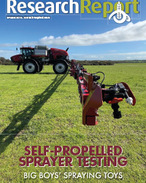This article is 8 years old. Images might not display.
CBH was fined $37,500 (and ordered to pay $3577 in costs) over insufficient guarding on machinery as well as failing to provide and maintain a safe work environment and, by that failure, causing serious harm to an employee.
The injury was sustained on a tripper, a funnel device that feeds grain from the ground to a stacker/loader and an electric conveyor machine used to transfer grain into open bulkhead storages.
In February 2014, a worker was helping to move a stacker/loader which was connected to a tripper on a conveyor at Bodallin. The female worker was acting as spotter on the right-hand side of the operator.
The electrical cable had reached its full length, so the worker unplugged it and handed it to another worker to plug into the next socket.
The operator called out 'all clear' and re-started the stacker/loader. The worker was watching the cord and had her hand on the safety mesh/guard to her right.
As the stacker/loader moved forward, the worker’s right hand fell onto the rail and the tripper wheel ran over it. The operator immediately stopped the machine and backed the tripper wheel off her hand.
The hand was extensively injured, resulting in three surgeries, the final of which was to amputate the little finger which had curled over and caused constant pain.
The tripper wheel was guarded, but the guard was upside down and incorrectly fitted on the wrong side of the wheel.
After the incident, CBH implemented a new design of tripper wheel guard to all its 197 sites across the State. The cost was $17.20 per guard, a total of just under $1.06 million.
Department of Mines, Industry Regulation and Safety Acting Deputy Director of General Safety Simon Ridge said it was always disappointing to see injuries caused by insufficient guarding on the moving parts of machinery.
“Guarding of the dangerous moving parts of machinery is such a basic and easy precaution to take, and employers need to take a good hard look at the guarding situation and stop exposing employees to the risk of injury,” Mr Ridge said.
“Subsequent to this incident, the employer installed new guards on all their tripper wheels. But if this had been done earlier, this incident would not have occurred and the employee involved would have been spared a great deal of suffering,” he said.
“This case should serve as a reminder to all employers of the importance of guarding the moving parts of machinery as part of fulfilling their obligation to provide and maintain a safe work environment for employees.”























